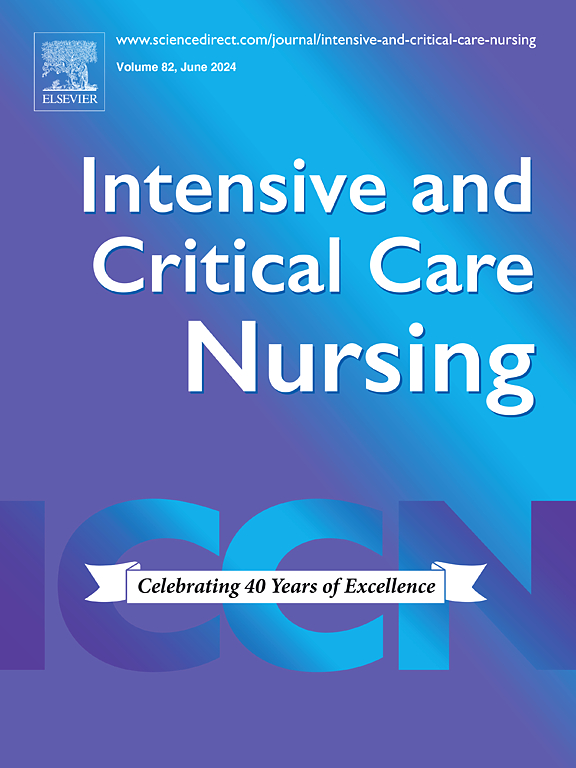探索家庭功能,通过治疗对话的照顾幼儿接受心脏直视手术:一项定性研究
IF 4.7
2区 医学
Q1 NURSING
引用次数: 0
摘要
儿童心脏直视手术面临着巨大的挑战,因为手术风险和术后不确定性深刻地影响着家庭。幼儿的照料者在重症监护期间经常面临焦虑、疲惫和无助,这突出了对发展和情感响应性支持的需求。目的探讨治疗性谈话对幼儿心内直视手术照顾者家庭功能的认知、情感和行为领域的影响。设计与方法本质性研究采用内容分析法探讨照顾者体验。在两个关键时间点:术后第1天就诊前和儿童从重症监护病房转出之前,与32名接受心脏直视手术的幼儿的护理人员进行了半结构化的治疗对话。对话以卡尔加里家庭干预模式(CFIM)的循环提问方法为指导。结果对治疗对话的分析确定了认知、情感和行为领域的六个主题。在会诊前,护理人员侧重于减少不确定性,管理压力和维持应对策略。通过预迁移,主题转变为适应照顾角色,预测未来的挑战,以及重组家庭生活。结论照护者的情绪反应从最初的焦虑转变为希望的增加和积极的计划,表明cfim引导的治疗性对话的积极影响。对临床实践的启示护士应采用有针对性的、基于关系的情感支持策略,特别是在重症监护环境中,以提高护理人员的幸福感,并在关键的术后恢复期加强家庭功能。本文章由计算机程序翻译,如有差异,请以英文原文为准。
Exploring family functioning through therapeutic conversations in caregivers of young children undergoing open-heart surgery: A qualitative study
Background
Pediatric open-heart surgery poses significant challenges, as surgical risks and postoperative uncertainties profoundly affect families. Caregivers of young children often face anxiety, exhaustion, and helplessness during intensive care, highlighting the need for developmentally and emotionally responsive support.
Objectives
To explore the impact of therapeutic conversations on the cognitive, emotional, and behavioral domains of family functioning among caregivers of young children undergoing open-heart surgery.
Design and methods
This qualitative study employed content analysis to explore caregiver experiences. Semi-structured therapeutic conversations were conducted with 32 caregivers of young children undergoing open-heart surgery at two key time points: before the postoperative day 1 visit and before the child’s transfer from the intensive care unit. Conversations were guided by the circular questioning approach of the Calgary Family Intervention Model (CFIM).
Results
Analysis of therapeutic conversations identified six themes across cognitive, emotional, and behavioral domains. At previsit, caregivers focused on reducing uncertainty, managing stress, and sustaining coping strategies. By pretransfer, themes shifted to adapting caregiving roles, anticipating future challenges, and reorganizing family life.
Conclusion
Caregivers’ emotional responses shifted from initial anxiety to increased hope and proactive planning, demonstrating the positive impact of CFIM-guided therapeutic conversations.
Implications for clinical practice
Nurses should incorporate targeted, relationship-based emotional support strategies, particularly in intensive care settings, to enhance caregiver well-being and strengthen family functioning during the critical postoperative recovery period.
求助全文
通过发布文献求助,成功后即可免费获取论文全文。
去求助
来源期刊

Intensive and Critical Care Nursing
NURSING-
CiteScore
6.30
自引率
15.10%
发文量
144
审稿时长
57 days
期刊介绍:
The aims of Intensive and Critical Care Nursing are to promote excellence of care of critically ill patients by specialist nurses and their professional colleagues; to provide an international and interdisciplinary forum for the publication, dissemination and exchange of research findings, experience and ideas; to develop and enhance the knowledge, skills, attitudes and creative thinking essential to good critical care nursing practice. The journal publishes reviews, updates and feature articles in addition to original papers and significant preliminary communications. Articles may deal with any part of practice including relevant clinical, research, educational, psychological and technological aspects.
 求助内容:
求助内容: 应助结果提醒方式:
应助结果提醒方式:


